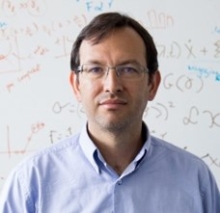MSE 298 Seminar (Zoom): Random Copolymers - Somewhere Between Proteins and Plastics

Professor
Department of Materials Science and Engineering
Massachusetts Institute of Technology
Zoom: Meeting ID 978 9061 7262, Passcode 438317
Abstract: Random heteropolymers (RHPs) have been a theoretical model system to understand properties of proteins and other sequence-defined polymers. In real life, RHPs have been used to tailor the properties of plastics and solutions for different applications. Recently, however, a new class of complex synthetic RHPs has displayed protein-like properties, which in turn has reinvigorated our imagination of what is possible with RHPs. In this talk, we will present our work on the atomistic structure and dynamics of a class of complex random heteropolymers composed of four or more chemically distinct monomers. Our work shows that these polymers display protein-like properties in terms of having a heterogenous surface, frozen backbones and complex unfolding behavior. These results are also dependent on the backbone chemistry and the medium. In the melt state, RHPs display a subtle glass transition, which can be tuned by the composition as well as the chemistry of the counterions. Interesting physics arise in these systems where macroscopic thermodynamics quantities do not display the usual hallmarks of a glass transition, yet the molecular constituents do. Their adsorption propensity to interfaces is also of much interest. Here we find that their adsorption potential is strongly dependent on temperature due to energy barriers in the reorganization pathway, yet one can accelerate the process by orders of magnitude with minimal amounts of “molecular plasticizers” or by working at liquid-liquid interfaces. To end this talk, I will explore some of the open questions in this area in relation to biology and sustainability.
Bio: Alfredo Alexander-Katz studied at UNAM (Mexico) and earned his B.S. in physics in 1998, then earned his Ph.D. in physics at UC Santa Barbara in 2004. Alexander-Katz's research focuses on biophysics, computational materials science, condensed matter physics, nanotechnology, polymers, and self-assembly. He is a professor of materials science and engineering, and director of the MIT Program in Polymers and Soft Matter. His doctoral work focused on understanding the self-assembly of copolymers using novel field-theoretical methods. As an NSF International Postdoctoral Fellow, he moved to Munich to study the dynamics of driven polymers. His work in Munich led to an important discovery that unraveled the mystery behind the process of blood clotting at high shear rates and opened new routes for the development of novel shear responsive materials. He later moved to the Ecole Superieure de Physique et Chimie Industrielle (Paris, France) as a CNRS postdoctoral researcher to study charged polymer solutions and their self-assembly with direct applications to fuel cells. His current interests lie in the realm of self-assembly and dynamics of biological soft-materials using a combination of analytical theory and simulations. His group is particularly focused on designing novel polymer-like drug delivery carriers and understanding their response to chemical and physical stimuli. This work aims to enable a new generation of drug-delivery vectors that could target different areas of the body in a very specific manner, and to provide a much deeper understanding of the processes of adhesion and targeting in flow. Other topics that he is currently pursuing are understanding the supramolecular self-assembly of chlorophyls in the antennas of photosynthetic bacteria, which are the most efficient light-harvesting organisms on Earth, as well as studying the dynamics of driven soft systems in general. The research in Alexander-Katz's group is highly interdisciplinary, and lies at the interface of materials, biology, physics, chemistry and medicine.
Share
Upcoming Events
-
EECS Seminar: Less Compute, More Intelligence – Efficient and Autonomous Generative AI and Agents
-
MAE 298: Microscopic Robots that Sense, Act and Compute
-
CBE 298 Seminar: Interface Modification for Electrocatalysis
-
CEE Ph.D. Defense Announcement: Machine Learning and Remote Sensing for Environmental Modeling - From Large-Scale Streamflow Forecasting to Malaria Risk Mapping
-
CBE Special Seminar: Operando Electrochemical Methods at Dynamic Energy Materials Interfaces
